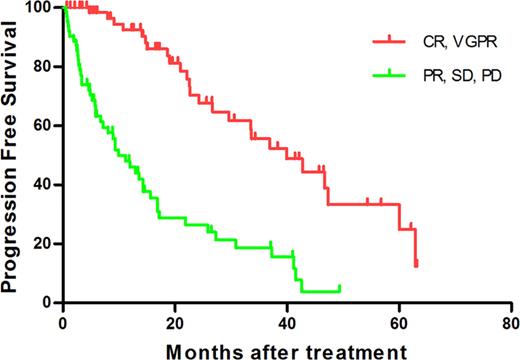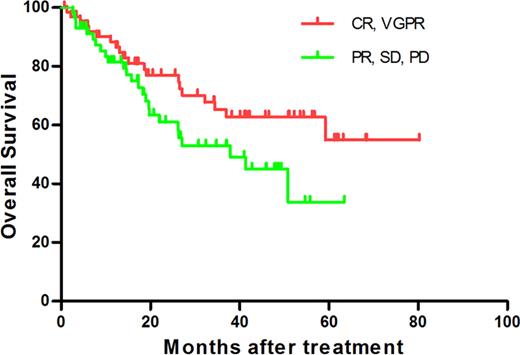Abstract
Abstract 5138
Response to treatment has been associated with improved survival in multiple myeloma (MM). The use of novel agents changed achievement of CR rates compared with conventional chemotherapy. The purpose of our study is to show influence of early response after treated with bortezomib combined chemotherapy to survival in patients with newly diagnosed MM who are ineligible for stem cell transplantation.
We assessed response at least forth cycles before next chemotherapy by international myeloma working group response criteria. The median duration from starting chemotherapy to initial response date was 2.3 month (range; 0.9 – 3.7 months). The enrolled cases were all received bortezomib combined chemotherapy as front line therapy. We divided into good response group (A group) which were included showing more than very good partial response (VGPR) and poor response group (B group) which were partial response (PR) or less than PR. Endpoints were comparision of progression free survival (PFS) and overall survival (OS) between A and B groups.
We retrospectively analyzed 129 patients registered data for our study from the Korean Multiple Myeloma Working Party (KMMWP) performed a nationwide registration of MM patients. In our results of initial response, 16 patients were in CR (12.4%), 50 were in VGPR (38.8%), 40 were in PR (31.0%), 14 were in SD (10.9%), and 9 were in PD (7.0%). However, in results of best responses, 46 patients were in CR (35.7%), 31 were in VGPR (24.0%), 32 were in PR (24.8%), 11 were in SD (8.5%) and 9 were in PD (7.0%). 3 years PFS of A group and B group were 55.6% and 18.4%, respectively (p-value < 0.001). 3 years OS of A and B group were 65.3% and 52.9%, respectively (p-value 0.078).
Early response at least forth cycles before next chemotherapy might be helpful for prediction of PFS in patients who were ineligible stem cell transplantation.
Response at the less than forth cycles after chemotherapy
| Early response . | Frequency (%) . | Cumulative percent (%) . | Best response . | Frequency (%) . | Cumulative percent (%) . |
|---|---|---|---|---|---|
| CR | 16 (12.4) | 12.4 | CR | 46 (35.7) | 35.7 |
| VGPR | 50 (38.8) | 51.2 | VGPR | 31 (24.0) | 59.7 |
| PR | 40 (31.0) | 82.2 | PR | 32 (24.8) | 84.5 |
| SD | 14 (10.9) | 93.0 | SD | 11 (8.5) | 93.0 |
| PD | 9 (7.0) | 100.0 | PD | 9 (7.0) | 100.0 |
| Early response . | Frequency (%) . | Cumulative percent (%) . | Best response . | Frequency (%) . | Cumulative percent (%) . |
|---|---|---|---|---|---|
| CR | 16 (12.4) | 12.4 | CR | 46 (35.7) | 35.7 |
| VGPR | 50 (38.8) | 51.2 | VGPR | 31 (24.0) | 59.7 |
| PR | 40 (31.0) | 82.2 | PR | 32 (24.8) | 84.5 |
| SD | 14 (10.9) | 93.0 | SD | 11 (8.5) | 93.0 |
| PD | 9 (7.0) | 100.0 | PD | 9 (7.0) | 100.0 |
3 years progression free survival and overall survival of more than very good partial response and partial response (PR) or less than PR at least forth cycles before next chemotherapy in patients with multiple myeloma treated with bortezomib combined chemotherapy
3 years progression free survival and overall survival of more than very good partial response and partial response (PR) or less than PR at least forth cycles before next chemotherapy in patients with multiple myeloma treated with bortezomib combined chemotherapy
No relevant conflicts of interest to declare.
Author notes
Asterisk with author names denotes non-ASH members.



This feature is available to Subscribers Only
Sign In or Create an Account Close Modal